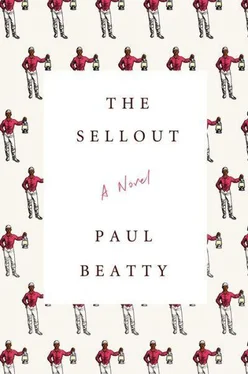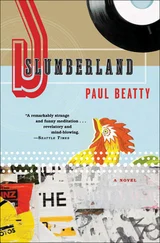“I can smell my movies in there.”
“Hominy, the place is empty.”
“They in there. I know it.”
“What, you going to dig up the yard like in ‘Unexpected Riches’?” I asked, invoking Spanky’s Our Gang swan song into the mix.
Hominy rattled the fence. And then I remembered the code like you remember your best friend’s childhood phone number. I punched 1-8-6-5 into the security box. The gate buzzed, the roller chain tightened and slowly pulled the gate open. 1865, black people are so fucking obvious.
“Massa, you coming?”
“Naw, you two have at it.”
Across Mulholland was a scenic overlook.
Facing north, I timed my run and sprinted between a speeding Maserati and two teenagers in a birthday BMW convertible. A dirt trail peeled down the mountainside and through the chaparral for about a mile or so, eventually leading to a side street and Crystalwater Canyon Park, a small but immaculately kept recreation area featuring a few picnic tables, some shade trees, and a basketball court. Ignoring the sap dripping down its trunk, I sat underneath a thick fir tree. The ballplayers limbered up for an after-work run or two before the sun set. A lone black man, in his mid-thirties, light-skinned and shirtless, paced at center court. He was one of those semiskilled hoopsters who frequented the white courts in ritzy neighborhoods like Brentwood and Laguna, looking for a decent game, an opportunity to dominate, and who knows, maybe even a job prospect.
“Any niggers out here for the attention, get the fuck off the court,” the brother yelled to the delight of the white boys.
The philosophy professor on sabbatical inbounded the ball. A personal-injury lawyer hit a corner jumper. Displaying a surprisingly good handle, a fat pharmacist crossovered a pediatrician, but bricked the layup. The day trader air-balled a shot that sailed out of bounds and rolled toward the parking lot. Even in L.A., where luxury cars, like shopping carts at the supermarket, are everywhere you look, Foy’s ’56 300SL was unmistakable. There couldn’t have been more than a hundred left on the planet. Near the front fender, Foy sat in a small lawn chair, dressed in only his boxers, a T-shirt, and sandals, chatting into his phone and typing on a laptop almost as old as his car. He was drying his clothes. His shirts and pants hanging from hangers hooked onto the car’s gull-wing doors, which were in full flight and hovering above like wings on a silver dragon. I had to ask. I got up and walked past the basketball game. Two players vying for a loose ball tumbled by. Arguing over possession before they got to their feet.
“Who’s that off of?” a player in beat-up sneakers asked me, his outstretched arms a silent plea for mercy. I recognized the guy. The mustachioed lead detective in a long-canceled but still-in-syndication cop show — big in Ukraine. “That’s off the dude with the hairy chest.” The movie star disagreed. But it was the right call.
Foy looked up at me from his chair, but didn’t stop talking or typing. Speaking in rapid-fire, unintelligible word salad into the phone, he wasn’t making much sense, something about high-speed rail and the return of the Pullman porter. The Mercedes coupe’s Pirelli whitewall tires were bald. Yellow foam oozed from the cracked and blistered leather seats like pus. Foy was probably homeless, but he refused to sell his watch, or a car that, at auction, even in its fucked-up condition, was worth several hundred thousand dollars. I had to ask.
“What are you writing?” Foy dropped the phone to his shoulder.
“A book of essays called Me Talk White One Day .”
“Foy, when’s the last time you had an original idea?”
Absolutely unoffended, Foy thought for a second, then said, “Probably not since your dad died,” before returning to his phone call.
* * *
I returned to Foy’s old house to find Hominy and Butterfly skinny-dipping in the pool, a little surprised that no nosy neighbors had bothered to call the police. One old black man looks like all the rest, I suppose. Night fell, and the underwater light flicked on automatically and quietly. The soft light-blue of a pool lit up at night is my favorite color. Hominy, pretending he couldn’t swim, was in the deep end, holding on to Butterfly’s ample flotation devices for all he was worth. He hadn’t found what he was looking for, his movies, but what he had managed to secure seemed to tide him over. I stripped down and slid into the water. No wonder Foy was broke, the temperature had to have been at least 90 degrees.
Floating on my back, I saw the North Star flicker through the steam rising from the water, pointing to a freedom that I didn’t even know if I needed. I thought of my father, whose ideas paid for that bank-owned property. I turned over into a dead man’s float and tried to position my body in the posture he was in when I found him dead in the street. What were my dad’s last words before they shot him? You don’t know who my son is. All this work, Dickens, the segregation, Marpessa, the farming, and I still don’t even know who I am.
You have to ask yourself two questions: Who am I? and How may I become myself?
I was as lost as I ever was, thinking seriously about tearing out the farmland, uprooting the crops, selling off the livestock, and putting in a big-ass wave pool. Because how cool would it be to surf in the backyard?
About two weeks after seeking the Lost Film Treasure of Laurel Canyon, the secret was out. The New -ish Republic magazine, which hadn’t had a child on its cover since the Lindbergh baby, broke the story. Above the caption “The New Jim Crow: Has Public Education Clipped the Wings of the White Child?” was a twelve-year-old white boy, posed as the pint-sized symbol of reverse racism. The new Jim Crow stood on the steps of Chaff Middle School wearing a heavy gold chain. Unruly tufts of dirty blond hair peeked out from under his wave cap and noise-reduction headphones. He toted an Ebonics textbook in one hand and a basketball in the other. Gold metal braces flashed through a lip-curling snarl, and the XXXL T-shirt he wore read Energy = an Emcee 2.
A long time ago, my father taught me that whenever you see a question on the cover of a news magazine, the answer is always “No,” because the editorial staff knows that questions with “Yes” answers would, like graphic cigarette warnings and close-ups of pus-oozing genitalia that tend not to deter but encourage smoking and unsafe sex, scare the reader off. So you get yellow journalism like: O. J. Simpson and Race: Will the Verdict Split America? No. Has TV Gone Too Far? No. Is Anti-Semitism on the March Again? No, because it never halted. Has Public Education Clipped the Wings of the White Child? No, because a week after that issue hit the newsstands, five white kids, their backpacks filled with books, rape whistles, and mace, hopped off a rented school bus and attempted to reintegrate Chaff Middle School, where Assistant Principal Charisma Molina stood in the doorway, barring entrance to her quasi-segregated institution.
Even if Charisma hadn’t counted on all the publicity about how if Chaff continued to improve at its current rate, it would become the fourth-highest-ranked public school in the county within the next year, she should’ve known that while 250 poor colored kids getting inferior educations will never be front-page news, the denial of even one white student access to a decent education would create a media shit storm. What no one could’ve foreseen, however, was a coalition of fed-up white parents listening to the advice of Foy Cheshire and pulling their children from underperforming public schools and overpriced private ones. And calling for a return to the forced busing many of their parents had so vehemently protested against a generation prior.
Читать дальше












